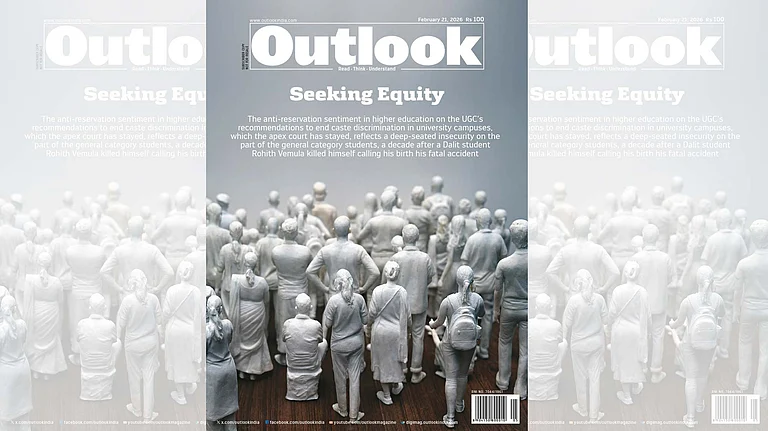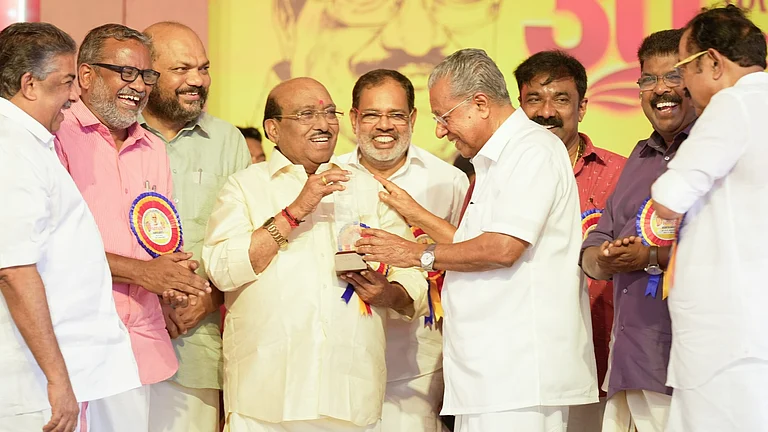Joisna Mary Joseph, a nurse working in Saudi Arabia who came on leave in April last year, went missing. When her sister called her on phone, it was found that she had gone with her boyfriend Shejin MS, a Muslim and an active member of CPI-M. On 11th April 2022, the members of the Parish under the Catholic Church at Kodenchery in Kozhikkode District held a protest March to the local police station against ‘love jihad’. Though the allegations of love jihad were very frequent in Kerala, that protest march was the first of its kind in the state. Kerala has not witnessed such an open declaration against love jihad on street before. Even nuns participated in the protest.
Joisna’s father Joseph alleged that she had been a victim of love jihad. He repeated this allegation to all the television channel reporters who went to meet him. He alleged that she was brain-washed and would be subjected to “forced conversion”. A habeas corpus petition was filed by him in the Kerala High Court. Joisna who appeared in the Court categorically said that she wanted to go with Shejin and the court let her go according to her will.
A section of the Christian leaders openly expressed grave concern over “hundreds of girls” being the victims of love jihad. They alleged that girls falling into the trap of love jihad undergo forced conversion. The right-wing groups, including the Bharatiya Janata Party (BJP), demanded investigation and extended all support to the Church and the family of Joisna.
One year has passed. What happened to Joisna? Did she undergo forced conversion? Is she wearing a burqa now? Outlook checked with the couple.
“What is this conversion debate about? One has to have a religion to make one convert. I don’t have any,” Shejin, who is an activist of CPI-M, is sarcastic about allegations of conversion and love jihad. Shejin is a rationalist. He says he stopped being religious in his early adolescence. Joisna and Shejin got married on 11th April 2022.
Nothing has changed in the life of Joisna. She went back to work to Saudi Arabia. She is not a rationalist like her husband. She used to follow Christian faith and continues to do the same.
“Faith is a matter of personal liberty,” says Joisna. “No question of conversion comes between us. Shejin is least bothered about religion. He counts everyone around him as human being.”
The only issue is that she finds it difficult to visit a church and participate in the prayer.
“Although there haven't been any unpleasant situations, we expect that someone seeing her in the church would cause trouble. We did not want to draw further attention to ourselves,” Shejin told Outlook. When they travel, he does manage to take his wife to churches.
The wounds created by an ordinary inter-faith marriage portrayed as love jihad would take time to heal. Joisna keeps in touch with her parents on phone, but her parents have not yet accepted her choice of her life partner. Do they still think that their daughter fell into the trap of love jihad? Outlook reached out to Joseph, father of Joisna.
“Now we are not worried about forced conversion or love jihad,” he said when it was pointed out to him that Joisna has not converted to Islam. However, Joseph is reluctant and confused. “Is it Love jihad? It is not, but I don’t know what else it is. We lost our daughter. She has not returned to us still.”
The myth of love jihad that spread out across the country had originated in Kerala and Karnataka in the second half of 2000s. In 2007, the fringe group, Hindu Janagaruti Samiti (HJS), raised the campaign against Hindu girls being in the company Muslim youth in Karnataka. They manhandled the young men and women sitting together in parks and other public places and started using the term “love jihad” to refer to the “threat of Hindu girls being taken away” by Muslim men. The phrase “Romeo Jihad” was first used in a front-page article of the Malayalam newspaper Kerala Kaumudi in 2009 which cited an “intelligence report” that claimed Muslim young men were carrying out a “jihad” by seducing Hindu women.
The first incident painted as love jihad took place in Kerala in 2009. Two Hindu girls eloped with their Muslim boyfriends who were MBA students at a college in Pathanamthitta district. Both girls informed the judge while they were being brought in court that they wanted to go with their partners. Instead of recognising their will, the Court sent them home with their parents, instructing them that they take their time and convince their parents.
The story had an unexpected twist. The girls changed their stand when they were produced in the court next time. They said that they wanted to go with their parents and not with their partners. While pronouncing an order in the bail application moved by the two Muslim men, the High Court of Kerala ordered a probe into the alleged ‘Romeo Jihad/Love jihad movement’ which targets non-Muslim girls. The then Director General of Police conducted a detailed enquiry and submitted the report that love jihad was non-existing as there was no evidence to substantiate the same. The inter-faith marriages could not be portrayed as the proof for the existence of love jihad, said the report.
In the same year, Karnataka High Court also had issued an order to investigate ‘love jihad’ expressing concern about the missing case of girls in the state. The Crime Investigation Department (CID) of Karnataka Police submitted an interim report that there was no primary evidence to establish the allegation of love jihad. The report said that “there was no organised attempt by any individual/organisations to entice girls belonging to Hindu/Christian religions to marry Muslim boys with the aim of converting them to Islam”. The Karnataka Police has informed the court that majority of the girls reported missing during the period of investigation were traced and found to have been eloped with Hindu men of different caste.
Though love jihad was planted and nurtured by Hindu right-wing groups, it was further taken forward by the Catholic Church in Kerala. In September 2019, George Kurian, the Vice Chairman of the Minority Commission, wrote to Amit Shah, urging for a National Investigation Agency (NIA) probe into the practice of love jihad. He raised this demand by quoting a report by the Kerala Catholic Bishop Council that claimed that 4,000 incidents of llove jihad had happened between a period 2005-12. An organisation called Christian Association and Alliance for Social Action (CASA) that takes overtly communal stands constantly came up with campaigns against alleged incidents of Love jihad in the social media. The Facebook page of CASA is often flooded with apparently communal messages targeting Muslims.
However, there are dissenting voices from within the community itself. The priests belonging to Ernakulam-Angamaly Archdiocese often talk against such campaigns. Sathyadeepam, a weekly published by this Archdiocese, has come up with articles and editorials arguing that love jihad is nothing but a myth created by the Sangh Parivar with the intention to create communal divide.
In the absence of a social support system, the inter-faith couples who are the victims of love jihad campaign often choose to remain as invisible as possible. Very few like Shejin and Joisna keep their social lives as active as it used to be — for Shejin is also a political activist. His social life is not diminished as he being a member of CPI-M and has a large social circle of the Left-Liberal people around him.
No one can forget Hadiya, the girl who created a storm in 2017, for her voluntary conversion to Islam and the controversial marriage thereafter. Hadiya, a BHMS student first shot into fame in May 2017 when the High Court of Kerala issued an order sending Hadiya with her father Ashokan against her will. Hadiya’s case was not that of a typical case of falling in love, eloping, and later converting. She converted first. She had to leave home because she was attracted to Islam and converted by choice. She married Shefin Jahan during the pendency of the writ petition filed by her father. According to Shefin, both of them found each other through a matrimonial website. The Supreme Court later annulled the High Court’s order and set Hadiya free.
The NIA also submitted the report that no evidence for love jihad was found and it was only a case of voluntary conversion and consensual marriage.
Eventually Hadiya has vanished from public memory. She is visible neither in social media nor in the public life in Kerala. What happened to Hadiya and her father Ashokan? Outlook reached out to both. Ashokan has become an active worker of BJP. He told Outlook that he was a sympathiser earlier as well. Though the entire social sphere of Kerala was divided over the issue and fought a fierce battle taking sides either with Hadiya or with Ashokan, the father and daughter are not cut off from each other. As years passed by, both of them slowly reconciled. They keep talking to each other.
“She calls us every day and talks to her mother,” Ashokan tells Outlook.
Was it a case of Love jihad? Ashokan does not think it is.
“No, I don’t think there is love jihad, but she converted,” Ashokan told Outlook. He has not yet come to terms with the idea of a voluntary conversion. Ashokan and his wife visited Hadiya a few times at her house in Kottakkal in Malappuram. Hadiya on the other side wants to keep away from the media glare and hence told Outlook that she would talk some other time.

























